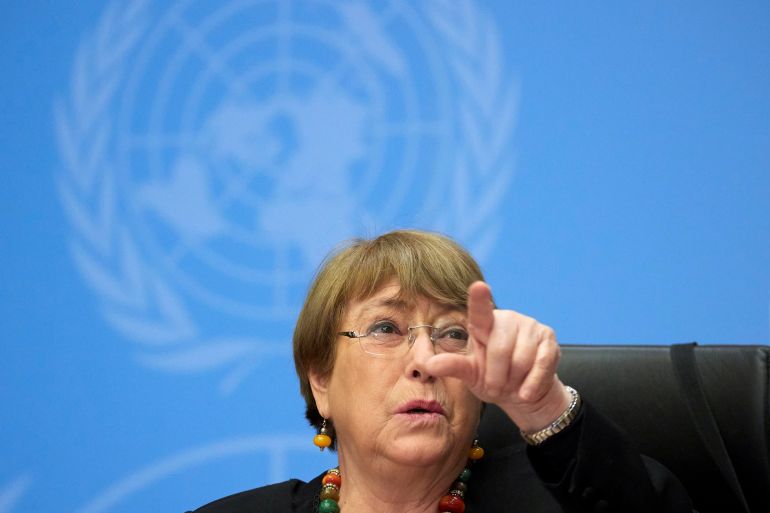Bachelet seeks Xinjiang trip amid reports of Uighur persecution
UN human rights chief says she is pressing for ‘meaningful access’ to the region this year.

UN human rights chief Michele Bachelet has said she hopes to agree terms for a visit this year to China, including its Xinjiang region, to look into reports of serious violations against the Uighur minority.
“I continue to discuss with China modalities for a visit, including meaningful access, to the Xinjiang Uyghur Autonomous Region,” Bachelet said on Monday, addressing the opening of a Human Rights Council session in Geneva.
Keep reading
list of 4 itemsChina policies ‘could cut millions of Uighur births in Xinjiang’
‘Uyghur Tribunal’ opens with testimony of alleged rape, torture
Australia Uighurs despair over ‘disappeared’ relatives in China
“[I] hope this can be achieved this year, particularly as reports of serious human rights violations continue to emerge.”
Bachelet’s remarks marked the first time she has publicly suggested a timeline for any such visit, which her office has been negotiating the terms of since September 2018.
She is under growing pressure from Western states to secure unfettered access to Xinjiang, where at least one million Uighurs, a largely Muslim ethnic group, have been detained in internment camps in the province, according to the UN.
Mass internment camps
Critics, including the UK and the US, say inmates at the camps have been subjected to human rights violations, including arbitrary detention, forced labour, torture, forced sterilisation and family separation.
Amnesty International and Human Rights Watch issued reports this year documenting anti-Uighur practices that they said could amount to crimes against humanity.
Beijing denies the accusations and describes the camps as vocational training facilities to combat religious extremism and boost economic development in the region.
Dozens of countries, led by Canada, are expected to deliver a joint statement to the council on Tuesday, voicing concern about the rights situation in Xinjiang and demanding China grant Bachelet and other independent observers access.
In anticipation of Tuesday’s statement, the Chinese mission in Geneva last week slammed the group for its efforts “to spread disinformation and lies to frame China” and use “human rights as a political tool”.
Hong Kong
Meanwhile, on the situation in Hong Kong, Bachelet told the council that the national security law imposed by China in the territory a year ago has had a “chilling impact” on democratic space and media in the former British colony.
The legislation criminalised much dissent, gave China jurisdiction over some cases and awarded authorities new investigation powers.
Bachelet said 107 people had been arrested under the law, including 57 formally charged.
“This will be an important test of independence for Hong Kong’s judiciary in its willingness to uphold Hong Kong’s obligations under the International Covenant on Civil and Political Rights, in accordance with the Basic Law,” she said.
Government officials in Beijing and Hong Kong say the national security law is needed to avert threats to national security, and that the rights and freedoms of ordinary Hong Kong people are being protected.
But critics say it is being used to crush dissent in the global financial hub.